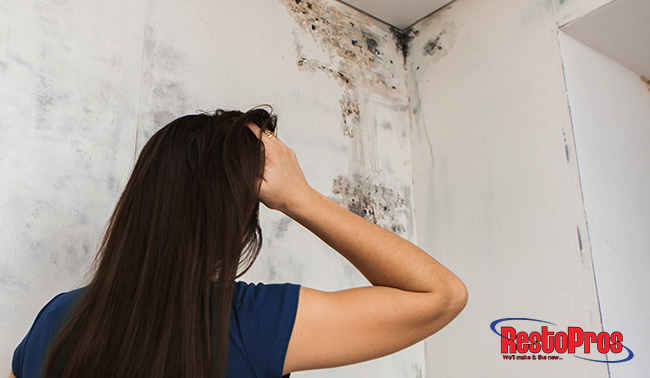
The term “black mold” is often used a blanket term to give the impression that mold is a highly toxic monster waiting to enter your home and wreak havoc on your kitchen, bathroom or basement. While mold is problem that should be dealt with before it gets out of hand, it’s important to understand the facts behind it to ensure you’re informed and prepared. If you suspect you have mold growth in your home, keep reading this guide from the team at RestoPros to answer your nagging question: What is black mold?
What is Black Mold?
Mold in general is a type of fungus that spreads through spores and can be found indoors and outdoors. While mold spores are often present everywhere, usually floating through the air or in dust, they grow in damp and moist conditions. That is why your kitchen, bathroom and basement are prone to mold—they are the damper areas in your home.
Black mold is not a specific type or species of mold. The term “black mold” is often used by news media to describe molds that produce mycotoxins. One of the species of molds that produce mycotoxins (toxic substances released by certain fungi) is Stachybotrys charatarum or Stachybotrys atra which is often referred to as black mold.
Stachybotrys atra is greenish-black in color and can grow on dust and lint as well as in areas where there is excessive moisture from humidity, water damage or flooding. There is no specific information about how often stachybotrys atra is found in residential buildings. It’s not rare but it is not as common as other mold species such as Aspergillus, Alternaria and Penicillium.
Is Black Mold Dangerous?
Now that you know what black mold is, it’s time you learned the facts about whether it is dangerous or not.
The most important thing to note about the dangers and health impacts of mold is that its effects depend on the individual. Usually, people susceptible to allergies might have a reaction to the presence of mold or more accurately, the toxins produced by mold. There is little information on the health effects of mycotoxins, but the consensus is that prolonged and direct exposure might lead to some reaction.
It has also been found that people with weaker immune systems might be more likely to get mold infections. In addition to that, people with asthma who encounter molds might experience the worsening of their asthma symptoms. Mold spores inhaled by people with asthma or those who are allergic to mold can cause their lungs to constrict and produce more mucus. This can lead to coughing, wheezing and shortness of breath.
How Do You Prevent Black Mold?
Just like other molds, black mold must immediately be removed to prevent any health risks as well as property damage. Here are some ways you can prevent black mold:
- Mold requires excess moisture to grow so it is important you maintain the moisture and humidity levels in your home. Ideally, the humidity levels must be kept between 30-50 percent to prevent mold. Invest in a hygrometer or a dehumidifier to control your humidity levels.
- Ensure your home has proper ventilation (especially damp spaces such as your bathroom) by using your exhaust fans.
- Keep your house clean and dust-free as much as you can. Regularly replace your AC air filters, clean out your fridge and ensure there are no clogs or leaks in your kitchen and bathroom.
- Try using non-toxic DIY mold cleaning products for mold prevention.
Stay Mold-Free with RestoPros!
At RestoPros we believe in arming our customers with the right information about mold removal so they can tackle mold when they see it. However, keep in mind that the best way you can be mold-free is with the help of professionals. Get in touch with the experts at RestoPros for our top-notch mold removal and remediation services by calling 855-587-3786 or by scheduling a service on our website!
